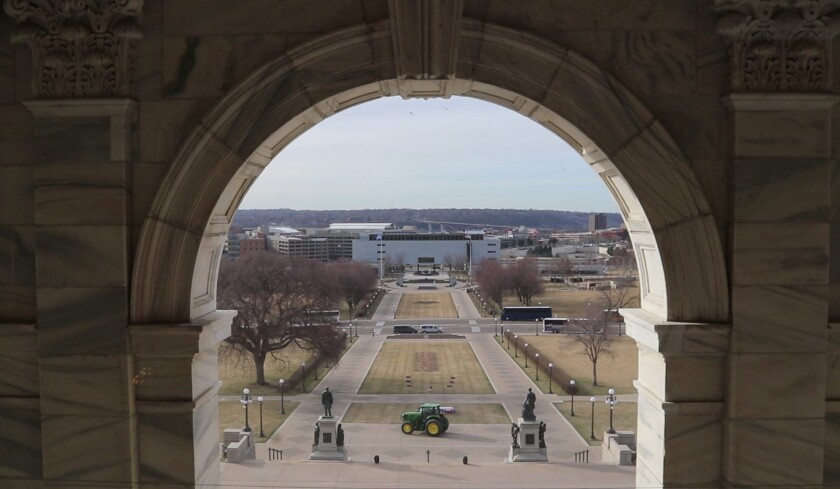ST. PAUL — Over 100 farmers and ranchers with the Minnesota Farm Bureau Federation got together on Minnesota's front lawn March 19 to share their stories, mark their accomplishments, and contemplate an uncertain future.
The group gathered on the Capitol Mall as part of the organization's annual Day on the Hill which coincided with National Ag Day for the second year in a row. Minnesota Farm Bureau's annual Day on the Hill was followed in the evening by its Ag Day Gala.
Organized by the Agriculture Council of America, National Agriculture Day occurs in March of every year and is meant to increase the public's awareness of agriculture's role in modern society. According to the group's website, the first National Ag Day program was held in 1973.
The day is also a time for producers and agricultural entities to tip their hats to one another, especially in top-producing states like Minnesota, said Agriculture Commissioner Thom Petersen.
Through howling winds on March 19, Petersen delivered a proclamation from Minnesota Gov. Tim Walz standing on the Capitol steps between the two statues of the first Minnesota-born and foreign-born governors. A John Deere tractor was parked in the crowd.
ADVERTISEMENT

"Always great to tell Minnesota's agricultural story," Petersen said of the state which ranks among the top-producing states in the country of sugarbeets, turkey, corn and soybeans.
Farmers dispersed inside the Capitol after the presentation to meet with elected officals and get a closer look at the current legislative session. Minnesota Farm Bureau President Dan Glessing said Day on the Hill is meant for farmers to share their stories and for lawmakers to listen.
"I appreciate getting all these folks here and talking about the issues that are affecting them," Glessing said. "We've got a long laundry list of things we could talk about, but each of those are specific to certain farmers, and every farmer has a story of what's affecting them on their farm."
The same tax
Discussions are ongoing over the next fertilizer tax, and whether to continue what's worked or gear the tax proceeds to fixing the state's water quality issues. In November of last year, the EPA called out state agencies including the ag department and instructed them to take additional steps to protect drinking water in southeast Minnesota from nitrate contamination.
"Water quality is really a big issue right now in the Legislature, so talking about those practices that farmers do is always important," Petersen said of farm bureau members sharing their experiences inside the Capitol.
The current fee of 40 cents of every ton of fertilizer, which the Minnesota Department of Ag has authority to raise and lower the inspection fee for, goes to fund the Agricultural Fertilizer Research and Education Council (AFREC). That is slated to end on June 30.
Senate Agriculture Chair Aric Putnam, DFL-St. Cloud, introduced legislation at the beginning of the month to extend the same funding structure through 2035, after hearing farmer support for the council throughout the many listening sessions he hosted in the past year.

"That's one of the things I like most about it, is how inclusive it is and how AFREC has farmer participation and farmer solutions," Putnam said. "I think we need to keep it going, and let it keep doing what it's doing well, and not monkey with it too much."
ADVERTISEMENT
The 10-year extension could be seen as a show of trust in the ag community to work together on water quality issues, said Putnam
"If you're going to have a tax, it's got to go towards something good," he said. "People have got to know what that good is, and I think there's something about the durability of our program that we can actually start to have some trust in it."
A new tax
Minnesota Farm Bureau along with the Minnesota Farmers Union and several other commodity groups oppose a different fertilizer tax proposal making its way through the Minnesota Legislature , authored by Rep. Rick Hansen, DFL-South St. Paul.
The bill would extend the existing Agricultural Fertilizer Research and Education Council fee by one year and increase the fertilizer inspection fee to a fixed rate, and require the MDA to implement a new fee on all nitrogen fertilizer sold or distributed in the state. Proceeds would go to aid payments to community health boards located in specified counties in southeast Minnesota.
A Minnesota House committee advanced the bill on Feb. 29, and with several farm bureau members who were at the Capitol on March 19 in attendance, a hearing was held on the bill by the House Environment and Natural Resources Committee, chaired by Hansen.
The legislation, which would levy a 99-cent fee per ton of nitrogen fertilizer, would increase if the amount of fertilizer sold in the state also went up.
Glessing said the bill would put unnecessary pressure on farmers including ones who've already committed to being a part of the water quality solution on the ground level.
"Farmers are always finding ways to do better," Glessing said. "We've had nutrient reduction strategies that have started and are really showing some promising results. The nitrate levels are going down."
ADVERTISEMENT
He said the bill in its current form, if passed by both bodies, would bring further financial distress to producers and be based on unsubstantiated claims.
"We're facing downward commodity prices, and profitability, but more importantly, collecting that tax is not going to lead to quicker results in southeast Minnesota," said Glessing, who suggested the best way to remedy the issue is through farmer-led advocacy work. "Those farmers are the boots on the ground, and can really see some benefit from practices that they adopt or try to adopt on their farms or ranches. That's the quicker answer."








